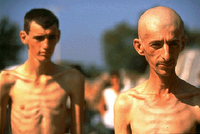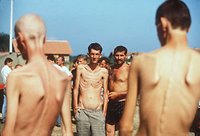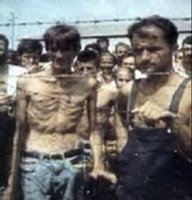MORAL EQUIVALISM IS FLAWED
 Fair and balanced observation of events does not mean one should exercise moral equivalism (relativism) or moral absolutism. I dismiss both methods of reasoning as flawed and subscribe myself to - what I call - moral perspectivism.
Fair and balanced observation of events does not mean one should exercise moral equivalism (relativism) or moral absolutism. I dismiss both methods of reasoning as flawed and subscribe myself to - what I call - moral perspectivism.My definition of moral perspectivism is: "Method of reasoning in which things are put into perspecive while both sides of the story are analyzed and given proper attention."
 Bosnia-Herzegovina has been suffering for a long time as a result of both moral equivalism and moral absolutism. Well before and well into the Bosnian war, Serbian media exercised moral absolutism by portraying Serbs as "endangered" people of Yugoslavia whose interests could only be protected by the creation of "Greater Serbia". During and after the war, Serbian media switched to moral equivalism equating Serbian crimes of genocidal proportions with individual war crimes committed by the troops of Army of Bosnia-Herzegovina.
Bosnia-Herzegovina has been suffering for a long time as a result of both moral equivalism and moral absolutism. Well before and well into the Bosnian war, Serbian media exercised moral absolutism by portraying Serbs as "endangered" people of Yugoslavia whose interests could only be protected by the creation of "Greater Serbia". During and after the war, Serbian media switched to moral equivalism equating Serbian crimes of genocidal proportions with individual war crimes committed by the troops of Army of Bosnia-Herzegovina.The United Nations condemned "moral equivalency" with respect to the international conflict that took place in Bosnia-Herzegovina during 1992-95:
The Serbs repeatedly exaggerated the extent of the raids out of Srebrenica as a pretext for the prosecution of a central war aim: to create geographically contiguous and ethnically pure territory along the Drina, while freeing their troops to fight in other parts of the country. The extent to which this pretext was accepted at face value by international actors and observers reflected the prism of “moral equivalency” through which the conflict in Bosnia was viewed by too many for too long. [source]
 Venezuela's former ambassador to the United Nations Diego Enrique Arria, recently said: "The Srebrenica massacre "is the greatest cover up in the history of the United Nations." [read here].
Venezuela's former ambassador to the United Nations Diego Enrique Arria, recently said: "The Srebrenica massacre "is the greatest cover up in the history of the United Nations." [read here].Ambassador Arria testified at the International Tribunal that the international community "did not move its little finger" to protect the Muslims in the enclave and "did not make it possible for them to defend themselves". There was a tendency in the Security Council, he said, to "morally equate the victims and the aggressor", thus avoiding the need to take action to prevent the humanitarian disaster.
Even some people who acknowledge Srebrenica genocide tend to fall into trap of moral equivalism. One example is Shaina whom I consider a friend of this blog.
In the following arguments I will demonstrate how moral relativism selectively distorts fairness in which supposed two sides of the story become - what I call - only "bits and pieces" of factual elements. In Shaina's article There was a Genocide in Srebrenica: Part III, she wrote:
It must be understood that all sides in the war committed war crimes, and that people of all ethnicities suffered greatly (and still continue to suffer) as a result of the war.Actually, this is only half of the story and typical example of moral equivalism. Here you could see typical error in judgement that people make (and I am not blaming her). Serb civilians did suffer, however, their suffering cannot be equated with the suffering of Bosniaks who were subjected to genocide. Basicly, the story goes that everybody committed war crimes, and everybody suffered, so be it - end of story. Well, not quite. What Shaina fails to mention is that not even one Bosnian Serb controlled city was under the siege by forces loyal to the Government of Bosnia-Herzegovina. In other words, Serbian civilians did not starve in enclaves without exits, they were not hunted down and slaughtered by thousands in one day, they were not subjected to planned and organized ethnic cleansing campaigns of genocidal proportions (however, Serbian media did pressure Serb civilians to leave cities under the control of Army of Bosnia-Herzegovina. Even after the Dayton Peace Agreement was signed, Serb civilians moved out of suburbs of Sarajevo voluntarily.) Not even one Serbian Church was destroyed in the cities who stayed under Bosnian-government control from beginning to the end of the Bosnian war (however, some Serb Churches were damaged. For example, Serb Churches of Sarajevo were damaged as a result of Serbian bombardment of the city). On contrast, not even one Muslim Mosque survived in places under Serbian control. Shaina continues her exercise of moral relativism by saying:
Bosnian Serb civilians were without a doubt, victims of war crimes & murder in the Srebrenica area.The correct argument would be that "some" Serb civilians were victims of war crimes and murder in the Srebrenica area, not all (as implied by the use of plural). We could easily change the wording of Shaina's argument and apply it to the Holocaust, e.g.: "German civilians were without a doubt, victims of war crimes & murder in the area of occupied Germany." Well, what does that mean? Does it mean that crimes against German civilians could be equated with the crimes against the victims of the Holocaust, including my grandfather. Over 100,000 Bosniak civilians perished in the Holocaust or about 8.1% of total Bosniak population residing in Bosnia-Herzegovina. Percentage-wise, Bosniak people were hit the hardest in the area. My grandmother still remember how Nazis summarily executed civilians in Muslim villages by hitting their heads with hammers (and other objects) and then throwing lifeless bodies into Sava river. Nazi collaborators, Serbian Chetniks, did the same by burning Bosniak villages and then killing civilians. Had she not survived Holocaust, I would not be alive today.
With respect to the alleged Serb civilian casualties around Srebrenica, let me quote conclusions made by internationaly funded Research & Documentation Center (RDC) in Sarajevo, which is comprised of Bosniak, Croat, Serb, and international investigators. In fact, the allegations that Serb casualties around Srebrenica, between April 1992 and December 1995 amount to over three thousand is an evident falsification of facts and an attempt to moraly equate victims of genocide with victims of individual war crimes:
Perhaps, the clearest illustration of gross exaggeration is that of Kravica, a Serb village near Bratunac attacked by the Bosnian Army on the morning of Orthodox Christmas, January 7, 1993. The allegations that the attack resulted in hundreds of civilian victims have been shown to be false. Insight into the original documentation of the Army of Republika Srpska (VRS) clearly shows that in fact military victims highly outnumber the civilian ones. The document entitled "Warpath of the Bratunac brigade", puts the military victims at 35 killed and 36 wounded; the number of civilian victims of the attack is eleven. [Read full report]Human Rights Watch agrees:
In fact, the Oric judgment confirms that there were Bosnian Serb military forces present in the village at the time of attack. In 1998, the wartime New York Times correspondent Chuck Sudetic wrote in his book on Srebrenica that, of forty-five Serbs who died in the Kravica attack, thirty-five were soldiers. Original Bosnian Serb army documents, according to the ICTY prosecutor and the Sarajevo-based Center for Research and Documentation of War Crimes, also indicate that thirty-five soldiers died. [source]In fact, less than 2,000 Serb civilians died in all of Bosnia as concluded by RDC (data, as of Dec 15, 2005). Shaina's next statement is offensively surprising and perfect example of moral equivalism:
To deny that the Srebrenica Commander, individual soldiers or at times individual civilians committed war crimes & atrocities and to deny the very real suffering of Bosnian Serbs in the Srebrenica area is a denial of an historic truth.
Secondly, some individual Bosniak soldiers did in fact commit crimes. Even though every life is precious - there is no perfect war. Even in Iraq, some individual American soldiers commited war crimes, but that does not mean that the American Army should be equated with extremist terrorists (suicide bombers and others) who are killing Muslim civilians in Iraq on a daily basis. Individual crimes are hard to prevent, however, what counts - among other things - is prevention of genocide, prevention of constant and intentional targetting of civilians, not blockading humanitarian convoys, not taking part in planned and organized killings of civilians, including state sponsored ethnic cleansing.
None of these evils can be attributed to the Bosnian-government soldiers on a larger scale, but they can be attributed to the genocidal forces of war crimes fugitives - Radovan Karadzic and Ratko Mladic. It is my belief that Shaina was not trying to equate Srebrenica defence forces with genocidal Serbian thugs who kept Srebrenica under the siege and even refused to let humanitarian convoys with food enter the city. But, Shaina's arguments seem to "imply" that since Serb forces were bad, so were Bosnian. Of course, this is completely ridicolous argument, which I already explained why.
Thirdly, Oric's attacks on Serbian military bases around Srebrenica were more justified than Serbian attacks on Srebrenica, because Oric's raids were conducted to collect food and medical supplies (as already stated in the United Nations' conclusions), while Serbian attacks had to do with wilful bombardments of civilians and completion of planned and well-organized genocide. Individual cases where civilians died as a result of Oric's raids are also not acceptable. Whether these civilian casualties were collateral damage or victims of wilful killings is debatable, however the fact that some Serb civilians died around Srebrenica cannot be denied (but must be put into perspective).
By further reading her article, one can notice that Shaina quickly switches from moral relativism to moral perspectivism and automatically her arguments automatically become more fair and more balanced than before, as witnessed in the following quote:
Unlike the Srebrenica justifiers, I will never excuse or justify war crimes committed against civilians. For the sake of Bosnia and for the sake of justice, all war crimes must be fully acknowledged and condemned; and all war criminals need to be brought to justice. The Srebrenica genocide deniers do not do this. While they have ignored the evidence of a calculated ethnic cleansing campaign against the Bosniaks; they have over exaggerated Bosniak war crimes in order to justify what happened in 1995. Furthermore, they continue to ignore Bosnian Serb war crimes occurring at the same time. This exposes their extreme hypocrisy.
 Bill Weinberg of World War 4 Report has been a long time supporter of human rights. In his article, Why Does Z Magazine Support Genocide (which I republished here), he argued against Srebrenica genocide revisionism.
Bill Weinberg of World War 4 Report has been a long time supporter of human rights. In his article, Why Does Z Magazine Support Genocide (which I republished here), he argued against Srebrenica genocide revisionism.Shortly after, his opinion was attacked by Ed Herman (also known as Edward Herman) who reduced himself to denying genocide that took place in Srebrenica.
(here you can read rebuttal to Ed Herman's claims).
In his response to Herman's make-believe stories, Bill Weinberg said:
Now isn't this interesting. Herman protests that just because he rejects the "standard narrative" on Srebrenica doesn't mean he supports genocide (denial is a form of support, as we all understand vis-a-vis Holocaust revisionism), yet he assumes that because I do accept the overwhelming evidence in support of the Srebrenica massacre, this means that I am engaging in "apologetics for war." It means nothing of the sort. I opposed US military intervention in the Balkans. But that opposition cannot be predicated on genocide denial or bogus moral equivalism or (worse) simply flipping reality on its head and portraying the Serbs as the victims and Bosnian Muslims as the aggressors.
I never claimed the Bosnian Muslim leadership were paragons of virtue who never told a lie. But I find it amusing that Herman is convinced by the names and addresses of Serb victims supplied by the Belgrade ambassador, but not those of the 7,800 men documented as missing from Srebrenica by the ICMP [International Commission on Missing Persons] (which Herman sarcastically calls "Bosnian Muslim truth-tellers" despite the fact that they aren't Bosnian Muslims).... The post-Yugoslav wars have been full of ghastly atrocities. Srebrenica was one which clearly crossed the line to genocide. I have never heard leftists contest that the 1981 El Mozote massacre in El Salvador (1,000 dead, by high estimates) or even the 1997 Acteal massacre in Chiapas (45 dead) were acts of genocide. But 8,000 dead at Srebrenica is dismissed as imperialist propaganda. We excoriated the Reagan administration for denying the massacre at El Mozote, but now engage in precisely the same behavior vis-a-vis Srebrenica. So much for moral consistency. (Bill Weinberg Suports Truth, Thank you - July 24, 2005)
There is a term for this attitude: moral relativism. In its far-left variety there are two sides to its coin. Combined with this all-trumping moralism in the left-revisionist mind-set, like the opposite pole of a magnet, is a cold-blooded immoralism, according to which the left-winger is absolutely unmoved by the crimes of the Revolution performed for the greater good. More striking even than the defence or denial of crimes against humanity carried out by the left revisionists is their sheer lack of any positive vision for the future or political raison d’etre whatsoever.
Disclaimer: My critique of few Shaina's arguments should in no way be construed as an attack on her opinion. In fact, the only reason I used her arguments was to compare moral relativism with moral perspectivism. Her activism and condemnation of Srebrenica genocide denial is both appreciated and valuable.


<< Home